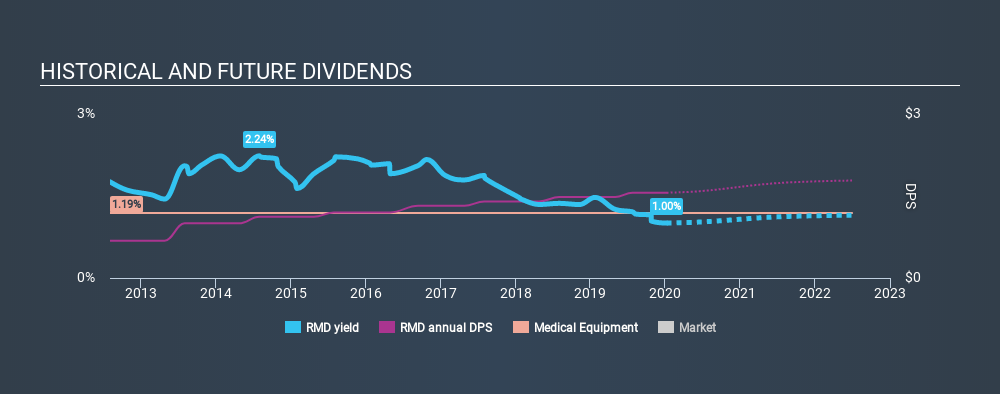- United States
- /
- Medical Equipment
- /
- NYSE:RMD
Could ResMed Inc. (NYSE:RMD) Have The Makings Of Another Dividend Aristocrat?

Is ResMed Inc. (NYSE:RMD) a good dividend stock? How can we tell? Dividend paying companies with growing earnings can be highly rewarding in the long term. Unfortunately, it's common for investors to be enticed in by the seemingly attractive yield, and lose money when the company has to cut its dividend payments.
With a 1.0% yield and a seven-year payment history, investors probably think ResMed looks like a reliable dividend stock. A 1.0% yield is not inspiring, but the longer payment history has some appeal. Some simple analysis can offer a lot of insights when buying a company for its dividend, and we'll go through this below.
Explore this interactive chart for our latest analysis on ResMed!

Payout ratios
Dividends are usually paid out of company earnings. If a company is paying more than it earns, then the dividend might become unsustainable - hardly an ideal situation. As a result, we should always investigate whether a company can afford its dividend, measured as a percentage of a company's net income after tax. Looking at the data, we can see that 52% of ResMed's profits were paid out as dividends in the last 12 months. This is a fairly normal payout ratio among most businesses. It allows a higher dividend to be paid to shareholders, but does limit the capital retained in the business - which could be good or bad.
We also measure dividends paid against a company's levered free cash flow, to see if enough cash was generated to cover the dividend. Of the free cash flow it generated last year, ResMed paid out 44% as dividends, suggesting the dividend is affordable. It's encouraging to see that the dividend is covered by both profit and cash flow. This generally suggests the dividend is sustainable, as long as earnings don't drop precipitously.
We update our data on ResMed every 24 hours, so you can always get our latest analysis of its financial health, here.
Dividend Volatility
One of the major risks of relying on dividend income, is the potential for a company to struggle financially and cut its dividend. Not only is your income cut, but the value of your investment declines as well - nasty. Looking at the data, we can see that ResMed has been paying a dividend for the past seven years. The dividend has been quite stable over the past seven years, which is great to see - although we usually like to see the dividend maintained for a decade before giving it full marks, though. During the past seven-year period, the first annual payment was US$0.68 in 2013, compared to US$1.56 last year. Dividends per share have grown at approximately 13% per year over this time.
We're not overly excited about the relatively short history of dividend payments, however the dividend is growing at a nice rate and we might take a closer look.
Dividend Growth Potential
Dividend payments have been consistent over the past few years, but we should always check if earnings per share (EPS) are growing, as this will help maintain the purchasing power of the dividend. ResMed has grown its earnings per share at 3.7% per annum over the past five years. 3.7% per annum is not a particularly high rate of growth, which we find curious. If the company is struggling to grow, perhaps that's why it elects to pay out more than half of its earnings to shareholders.
Conclusion
Dividend investors should always want to know if a) a company's dividends are affordable, b) if there is a track record of consistent payments, and c) if the dividend is capable of growing. First, we think ResMed has an acceptable payout ratio and its dividend is well covered by cashflow. Second, earnings growth has been ordinary, and its history of dividend payments is shorter than we'd like. While we're not hugely bearish on it, overall we think there are potentially better dividend stocks than ResMed out there.
Earnings growth generally bodes well for the future value of company dividend payments. See if the 14 ResMed analysts we track are forecasting continued growth with our free report on analyst estimates for the company.
Looking for more high-yielding dividend ideas? Try our curated list of dividend stocks with a yield above 3%.
If you spot an error that warrants correction, please contact the editor at editorial-team@simplywallst.com. This article by Simply Wall St is general in nature. It does not constitute a recommendation to buy or sell any stock, and does not take account of your objectives, or your financial situation. Simply Wall St has no position in the stocks mentioned.
We aim to bring you long-term focused research analysis driven by fundamental data. Note that our analysis may not factor in the latest price-sensitive company announcements or qualitative material. Thank you for reading.
About NYSE:RMD
ResMed
Develops, manufactures, distributes, and markets medical devices and cloud-based software applications for the healthcare markets.
Outstanding track record with flawless balance sheet and pays a dividend.
Similar Companies
Market Insights
Community Narratives



